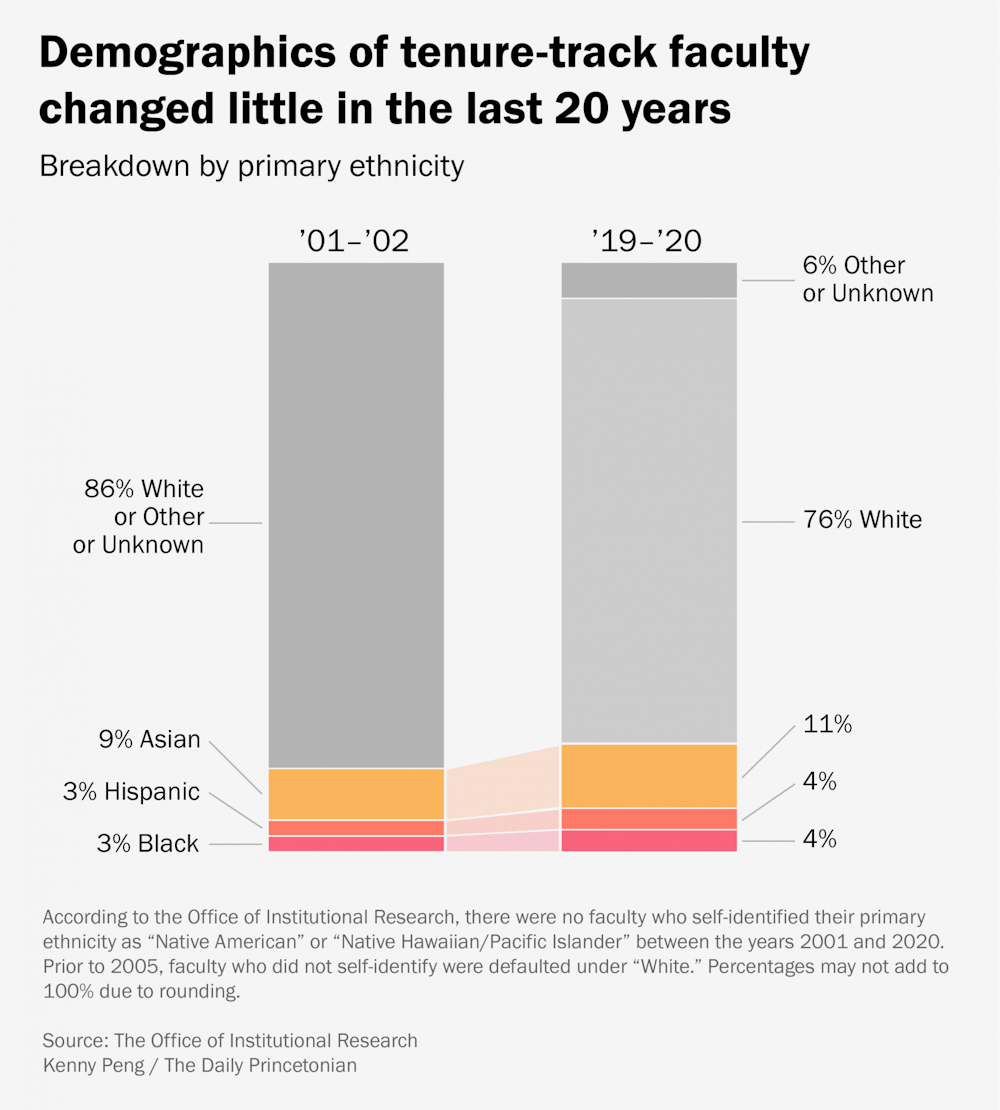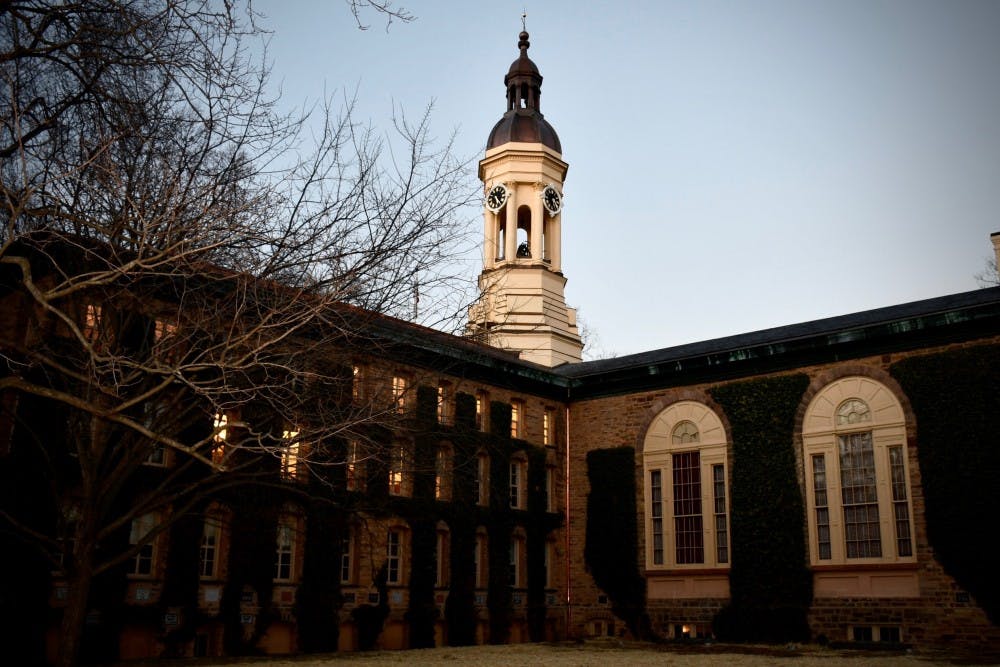In an open letter sent July 4, over 350 University faculty members urged University President Christopher L. Eisgruber ’83 and other high-ranking administrators to take anti-racist action, asking that they “acknowledge and give priority” to 48 demands detailed beneath.
The letter includes several high-profile signatories, including Chair of the African American Studies (AAS) Department Eddie S. Glaude, Jr. GS ’97 and Chair of the Lewis Center for the Arts Tracy K. Smith.
The letter — which urges actions at University-wide, faculty, postdoc, graduate student, and undergraduate levels — covers a broad range of proposals, including increased hiring from underrepresented communities, formal divestment from prisons, and anti-racist iconography on campus.
As of July 7, faculty from 34 of the University’s 36 departments — all but Chemical and Biological Engineering (CBE) and Operations Research and Financial Engineering (ORFE) — had signed the letter. Also among the signatories are employees of multiple University centers and administrative offices.
“Imagine if the administration did that”
The letter follows a University announcement last month, in which Eisgruber tasked senior academic and administrative officials to prepare reports that identify “specific actions that can be taken in their areas of responsibility to confront racism.”
Jenny Greene, professor of astrophysics and director of the Prison Teaching Initiative, spearheaded the letter and sought input from an email listserv of politically engaged faculty. She eventually enlisted the help of Smith, Director of Gauss Seminars in Criticism Andrew Cole and Associate Professor of Classics Dan-el Padilla Peralta ’06.
The letter begins by explaining the detrimental effects that anti-Black racism wreaks in the United States and at the University. “We call upon the University to amplify its commitment to Black people and all people of color on this campus as central to its mission, and to become, for the first time in its history, an anti-racist institution,” the letter reads.
The signatories call for specific curricular changes, anti-racist hiring and admissions measures, and a reexamination of how the University invests — demanding an increase in financial contributions to community organizations that fight racial and socioeconomic inequality. The signatories also hope to increase the number of faculty of color who sit important decision-making bodies and urge “the training and promotion of a more diverse cohort of senior administrators.”
University Spokesperson Ben Chang expressed gratitude to the faculty who created and signed the letter and emphasized Eisgruber’s commitment to critically examining the University’s practices.
“The letter covers a range of topics, and as part of the process laid out in June, we are currently reviewing these and other suggestions for change that have been made by members of our community,” he wrote in an email to The Daily Princetonian. “The Dean of the Faculty has been in touch with a number of faculty members as part of this process, and will continue to ensure that faculty voices remain a part of this ongoing work.”
The signatories call for the University to hire an outside committee of experts to help implement the requests. Smith emphasized this particular measure’s importance.

“If they simply say these things are good, now go off and do them, the same thing will happen that happens whenever the university tells departments to go do something,” she explained. “They’re going to do it in the way they’ve always done it, and they’re going to revert to the practices, the shortcuts, the biases that have inhibited them from making progress in this regard in the past.”
At the University level, the letter emphasizes that people of color must participate in decision-making committees and hold “prominent leadership positions.” For example, the letter calls for the Academic Planning Group and the Committee on Committees to include more faculty of color.
“Only 4% of Princeton’s full professors are Black,” the letter notes.

Demographics of tenure-track faculty
In order to increase faculty diversity, which the letter notes has stagnated in the past 20 years, the signatories call for the University to prioritize Target of Opportunity hires, report demographic hiring data annually, financially support departments with comparatively successful track records in sustaining diversity, enforce repercussions against departments that neglect to find diverse candidate pools, support junior faculty of color, and recognize faculty who promote inclusion.
In addition to calls for University change, the writers believe faculty need to do more at a department level — where Greene says “a lot of power does reside. You know, at the end of the day we make hiring decisions.”
Another request is that the University “acknowledge the invisible work that faculty of color are compelled to do,” through mentoring and service on diversity committees.
“We’re capable of doing that, but it should be recognized and it should be valued,” Smith said.
The letter also encourages additional undergraduate mentoring opportunities, in which seniors, “including historically underrepresented students,” would receive compensation to mentor younger undergraduates.
The interviewed faculty stressed recommendations that call for administrators to meet with and listen to students, staff, and faculty of color.
“Imagine if the administration did that,” Smith said. “Imagine how much more they would know about this institution that they’re running and imagine how much safer and more valued the students that are right now feeling underseen and misunderstood, imagine how different they would feel.”
Curricular change, campus iconography, and postdoctoral diversity
Regarding undergraduates, the letter calls for the University to acknowledge student activism and scholarship on race by creating a senior thesis prize for scholarship on race, funding anti-racist groups and conferences, and acknowledging the Black Justice League’s role in pushing the University to remove the name of Woodrow Wilson, Class of 1879, from First College and the School of Public and International Affairs (SPIA).
“We see ourselves as acting in solidarity with and in support of students who have modeled what it means to exhibit an activist ethos on our campus and carry out the mission of transforming Princeton into an anti-racist institution,” Padilla Peralta said.
Furthermore, the letter addresses curricular changes, calling for students to be educated about the University’s history with racism during first-year orientation, making use of the annual pre-read as an anti-racist tool, and a distribution requirement focusing on race in the United States and Princeton.
Last year, the University implemented a Culture and Difference requirement and the School of Public and International Affairs (SPIA) recently implemented a Diversity, Equity, and Inclusion (DEI) core requirement — but the faculty members hope for more.
“We also want to think in big terms about what racism is, and we want to bring the vocabulary and the practice of anti-racism to the University,” Smith added. “We’re not so good at recognizing the reality, and the pervasiveness, of systemic racism, and I think that is actually what drives so much of the inequity at Princeton.”
The signatories call for the University to remove a statue of John Witherspoon, the University’s sixth president and a slaveholder, that sits adjacent to East Pyne Hall. Furthermore, they urge the University to examine its association with the Firestone Company, whose founder financed the University’s library, and “consider acknowledging this history with a marker.”
Other undergraduate-level requests in the letter focus on admissions, calling for a reconsideration of legacy admissions, an increase in transfer admissions, and scholarships for students of the Nanticoke Lenni-Lenape Tribal Nation, an indigenous tribal nation whose ancestors inhabited the land where the University sits.
On the postdoctorate level, the letter calls for more support in recruiting postdocs of color, investment in postdocs through mentorship and research funding, integration of postdocs into departments, and a commitment to hiring postdocs to tenure-track faculty positions.
Faculty also called for widespread anti-racism training that recognizes the needs of specific groups, with the goal of achieving diverse hiring and recruiting at all levels. Furthermore, they proposed a committee dedicated to investigating instances of discrimination.
Other requests include creating a more explicit policy on non-Deferred Action for Childhood Arrivals (DACA) undocumented applicants, reconsidering the use of standardized tests in admissions, removing questions about criminal convictions on applications, funding a chaired professorship in Indigenous Studies, and acknowledging that the University sits on indigenous land on the University homepage.
Among the signatories are Gabriel Duguay ’22 and Katherine Schassler ’21, who sit on the Undergraduate Student Government (USG) Indigeneity at Princeton Task Force.
One theme throughout the letter is a call for more funding to anti-racism initiatives. For one, faculty request a center focused on racism and anti-racism — echoing an earlier demand from SPIA graduate students. Greene lamented what she sees as a lack of funding of the Predoctoral Fellowship Initiative, which helps graduate students from underrepresented groups. The letter cited Harvard’s $5 million commitment to confronting its ties with slavery.
“We have to look at where those resources are allocated within this institution. And within this institution in some ways, it’s a microcosm of this country, of modernity,” McEwen said.
“We are the University”
The interviewed professors were cautiously optimistic that this political moment may yield substantive change at the University. “You have to seize these moments and try to get as much thinking and resources and changes as you can and then know that you’re still going to have lots and lots of longer term work to do,” Greene said.
“We should have done it 10 years ago, we should have done it 20 years ago, we should have done it 30 years ago, we should have done it 40 years ago,” said Assistant Professor of Architecture V. Mitch McEwen, a signatory of the letter. “But we’re doing it now.”
For Padilla Peralta — a University alum who has spoken about his experiences with racism as an undergraduate — his advocacy stems from an understanding that “we are the University.”
“For all of us — students, staff, administrators, faculty — it will be years of applying ourselves to activist work within the University. The idea is to make it into an institution that is not just ready for structural change, but that is committed to seeing structural change through. And if that readiness isn’t there yet, then we as a community, have to bring that readiness to be,” he said.
According to the earlier announcement, members of the University Cabinet — which includes Dean of the Faculty Sanjeev Kulkarni — have been asked to submit their reports on anti-racist action by August 21.
“The group will come together in late August to develop plans for implementing such actions,” according to Eisgruber’s letter.








